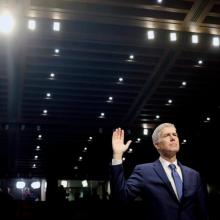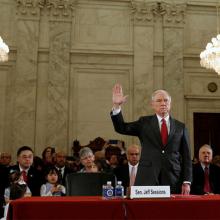U.S. Supreme Court
It may take years to fully grasp the import of the Supreme Court’s decision in Trinity Lutheran Church v. Comer, where the court ruled 7-2 that the state of Missouri had expressly and unjustifiably discriminated against a church by disqualifying it from receiving a public benefit (scrap tire to enhance playground safety) solely because of the church’s religious character.
But here are six initial observations about the ruling:
The Supreme Court has ruled for a Missouri church that claimed religious discrimination after it was refused state funds to improve its playground.
Ruling 7-2, the court on June 26 determined that the state had unfairly denied funds for Trinity Lutheran Church in Columbia under the First Amendment’s free exercise clause.
The court ruled that Trump may bar people from six majority Muslim countries — Iran, Libya, Somalia, Sudan, Syria, and Yemen — if they have no “bona fide” relationship to the U.S. Those that have established ties will be allowed to continue entering the country.
That means officials at the Department of Homeland Security and the State Department will have to begin sorting through each application submitted by travelers from the six targeted countries to determine if they have enough of a link to the U.S. to enter.

Image via Rena Schild/Shutterstock.com
On June 26, the U.S. Supreme Court decided to hear during its next term a case regarding President Trump’s ban on travel into the U.S. for people from six countries whose populations are majorly Muslim. In doing so, the Supreme Court permitted a revised version of President Trump’s ban to go into effect immediately until the case is heard. The Supreme Court’s next term will begin in October.
Catholics, Jews, Protestants, Muslims, and others reacted vigorously and emotionally to President Trump’s announcement that he will withdraw the United States from the 2015 Paris climate change agreement.
While leaders of the so-called religious left were overwhelmingly critical of the move, conservatives were somewhat divided.
According to the lawsuit, Country Mill is the only business to have been prohibited under the market’s anti-discrimination policy.
In a statement, the city of East Lansing said the farmer’s refusal to host a same-sex wedding violated a “long-standing ordinance that protects sexual orientation as well as the Supreme Court’s ruling that grants the right for same-sex couples to be married.”
While not yet final, the regulation appears intended to let employers avoid providing birth control coverage if they object for any reason — an expansion of the original effort to exempt those with religious objections. As a result, abortion rights groups warn that up to 55 million women could lose free birth control coverage — something that saves them $1.4 billion annually.
A federal appeals court in Richmond has delivered yet another blow to President Trump’s effort to institute a travel ban targeting six majority-Muslim countries, making a final Supreme Court showdown more likely.
The full U.S. Court of Appeals for the 4th Circuit ruled 10-3 on May 25 to uphold a lower court’s decision that barred the Trump administration from implementing its second attempt at the travel ban.
The U.S. Supreme Court has refused to hear an appeal by Republican leaders of a federal court ruling that removed ballot restrictions in North Carolina, due to the restrictions being discriminatory along the basis of race, reports Bloomberg News.
Donald Trump thanked conservative Christians for their votes, and promised to protect their values in his first commencement address as president, at evangelical stronghold Liberty University.
“In America, we don’t worship government, we worship God,” he said to raucous applause at the graduation, at the nation’s largest Christian university, on March 13, in Lynchburg, Va.
In Trump’s first nominee, Judge Neil Gorsuch, abortion foes were convinced they had the jurist who would fulfill Trump’s campaign promise to appoint justices who would deliver the reversal they have worked decades to achieve. But now, after last week’s hearings before the Senate Judiciary Committee, some are voicing concern that Gorsuch might not be such a reliable anti-Roe vote after all.
A U.S. federal judge in Virginia ruled on March 24 that President Donald Trump's travel ban was justified, increasing the likelihood the measure will go before the Supreme Court, as the decision took an opposing view to courts in Maryland and Hawaii that have halted the order.
U.S. District Court Judge Anthony Trenga rejected arguments by Muslim plaintiffs, who claimed Trump's March 6 executive order temporarily banning the entry of all refugees and travelers from six Muslim-majority countries was discriminatory.
The May 13 speech at Liberty’s football stadium in Lynchburg, Va., will be Trump’s first commencement address as president, but it won’t be his first at Liberty, which describes itself as the largest Christian university in the world.
The then-presidential candidate spoke last year at the university’s Convocation, promising, “I will protect Christians,” and famously stumbling over a reference to “Two Corinthians.”
The pro-Trump evangelicals suffer from a spiritual crisis, not a political one.
Moore has challenged the foundations of conservative evangelical political engagement because they desperately needed to be shaken. For 35 years, the old-guard religious right has uncritically coddled, defended, and promoted the Republican Party.
Despite President Trump’s threat of a “Muslim ban” during the 2016 campaign, Hadil Mansoor Al-Mowafak, a 20-year-old international affairs student at Stanford University, was taken aback when he banned travel from seven Muslim countries, including Yemen, where her husband lives.
“I didn’t think it was even possible,” Al-Mowafak said. “I thought he just used the Muslim ban during his campaign, and once he took power he’d face reality.”
Conservative Christians in particular cheered [Trump's] nomination of Neil Gorsuch to the Supreme Court, and his promised “fix” for the Johnson Amendment, which restricts pastors' ability to politick in the pulpit.
But, for the second time since his inauguration, Trump has decided to retain an Obama-era initiative to protect sexual minorities.
A Catholic priest who fled to the U.S. from war-torn Vietnam as a youth has written to President Trump, offering to surrender his American citizenship so that the president could confer it on a Syrian refugee, who would be barred under Trump’s controversial order banning travelers from Syria and six other Muslim-majority countries.
The Rev. Chuong Hoai Nguyen, a member of the Salesian order, also told Trump he would ask his religious superiors for permission to go live and work in one of the seven countries on the banned list.
Neil Gorsuch, President Trump’s Supreme Court nominee, is known for his commitment to religious freedom and preventing government from discriminating against religious organizations and individuals.
If confirmed, the new justice could help sway a case that could be a landmark in American education, paving the way for public funds to go to private schools.
Senator Jeff Sessions of Alabama recently raised eyebrows during his confirmation hearing for attorney general when he expressed doubts that secular people respected the truth as much as did those with religious convictions. Even as he insisted that there should be no religious tests for holding public office, Sessions was queasy about the potential dangers of the secular worldview.
For much of its long history in the U.S., the Catholic Church was known as the champion of the working class, a community of immigrants whose leaders were steadfast in support of organized labor and economic justice – a faith-based agenda that helped provide a path to success for its largely working-class flock.
In recent decades, as those ethnic European Catholics assimilated and grew wealthier, and as the concerns of the American hierarchy shifted to battles over moral issues, such as abortion and gay marriage, traditional pocketbook issues took a back seat.


















